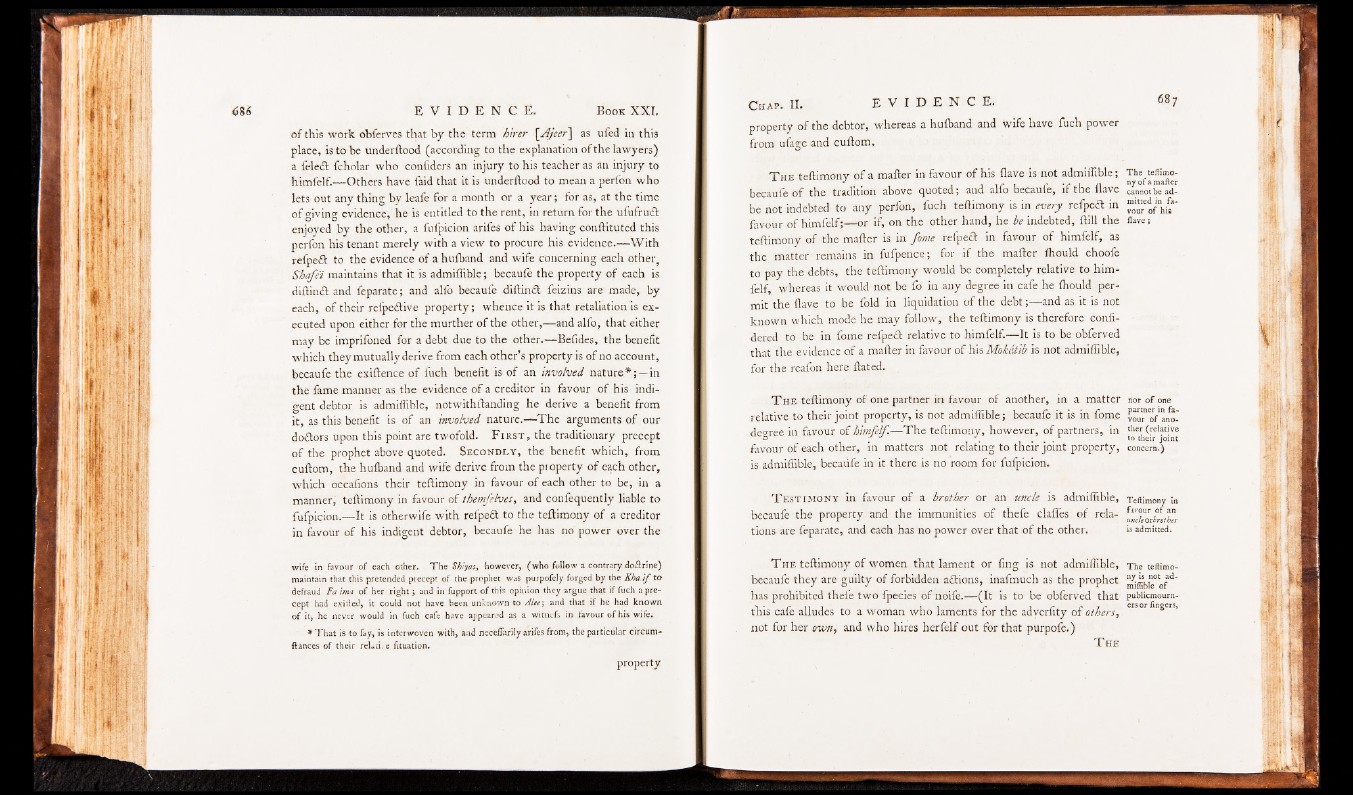
of this work obferves that by the term hirer \Ajeer\ as ufed in this
place, is to be underftood (according to the explanation of the lawyers)
a feleft fcholar who confiders an injury to his teacher as an injury to
himfelf.— Others have faid that it is underftood to mean a perfon who
lets out any thing by leafe for a month or a year; for as, at the time
of giving evidence, he is entitled to the rent, in return for the ufufruct
enjoyed ,by the other, a fufpicion arifes of his having conftituted this
perfon his tenant merely with a view to procure his evidence.— With
refpeft to the evidence of a hulband and wife concerning each other,
Shafei maintains that it is admiffible; becaufe the property of each is
diftinft and feparate; and alfo becaufe diftinót feizins are made, by
each, of their refpeöive property; whence it is that retaliation is executed
upon either for the murther of the other,— and alfo, that either
may be imprifoned for a debt due to the other.— Befides, the benefit
which they mutually derive from each other’s property is of no account,
becaufe the exiftence of fuch benefit is of an involved nature*;—in
the fame manner as the evidence of a creditor in favour of his' indigent
debtor is admiffible, notwithftanding he derive a benefit from
it, as this benefit is of an involved nature.— The arguments of our
doctors upon this point are twofold. F i r s t , the traditionary precept
of the prophet above quoted. S e c o n d l y , the benefit which, from
cuftom, the hufband and wife derive from the property of each other,
which occafions their teftimony in favour of each other to be, in a
manner, teftimony in favour of themfelves, and confeqüently liable to
fufpicion.— It is otherwife with refpeft to the teftimony of a creditor
in favour of his indigent debtor, becaufe he has no power over the
wife in favour o f each other. T h e Shiyas, however, (who follow a contrary do&rine)
maintain that this pretended precept o f the prophet was purpofely forged by the Kha.if to
defraud Fa ima o f her r ig h t ; and in fupport o f this opinion they argue that if fuch a precept
had exifted, it could not have been unknown to Alee‘, and that if he had known
o f it, he never would in fuch cafe have appeared as a witnefs in favour o f his wife.
* T h a t is to fay, is interwoven with, and neceflarily arifes from, the particular circum-
ftances o f their relati.e fituation.
property
property of the debtor, whereas a hulband and wife have fuch power
from ufage and cuftom.
T he teftimony of a mafter in favour of his Have is not admiffible ;
becaufe of the tradition above quoted ; and alfo becaufe, if the flave
be not indebted to any perfon, fuch teftimony is in every refpeft in
favour of himfelf;— or if, on the other hand, he be indebted, ftill the
teftimony of the mafter is in fame refpeft in favour of himfelf, as
the matter remains in fufpence; for if the mafter fhould choofe
to pay the debts, the teftimony would be completely relative to himfelf,
whereas it would not be fo in any degree in cafe he fhould permit
the flave to be fold in liquidation of the debt ;— and as it is not
known which mode he may follow, the teftimony is therefore confi-
dered to be in fome refpeft relative to himfelf.— It is to be obferved
that the evidence,of a mafter in favour of his Mokâtib is not admiffible,
for the reafon here ftated.
T he teftimony of one partner in favour of another, in a matter
relative to their joint propérty, is not admiffible; becaufe it is in fome
deoree in favour of himfelf.— The teftimony, however, of partners, in
favour of each other, in matters not relating to their joint property,
is admiffible, becaufe in it there is no room for fufpicion.
T e s t im o n y in favour o f a brother or an uncle is admiffible,
becaufe the property and the immunities of thefe clafles of relations
are feparate, and each has no power over that of the other.
T he teftimony of women that lament or fing is not admiffible,
becaufe they are guilty of forbidden actions, inafmuch as the prophet
has prohibited thefe two fpecies of noife.— (It is to be obferved that
this cafe alludes to a woman who laments for the adverfity of others,
not for her own, and who hires herfelf out for that purpofe.)
The teftimony
o f a mafter
cannot be admitted
in favour
o f his
flave;
nor o f one
partner in favour
o f another
(relative
to their joint
concern.)
Teftimony in
favour o f an
uncle oxbrot her
is admitted.
The teftimony
is not ad-
miflible of
publicmourn-
ers or fingers,
T he